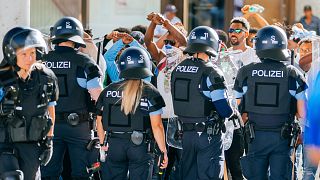Germany
Germany has begun random checks at its borders with five Western European nations, expanding a system of controls already in place at its four other borders.
The police controls began at the borders with France, the Netherlands, Belgium, Luxembourg, and Denmark on Monday morning and are due to continue for six months.
The coalition government is under increasing pressure over migration following recent deadly knife attacks in which the suspects were asylum seekers.
In August, the Islamic State group claimed responsibility for a knife attack in the western city of Solingen in which three people were killed.
Germany has also seen a rise in support for the opposition far-right and conservatives pushing immigration and security concerns higher on the political agenda.
However, experts have questioned the long-term effectiveness of the measure.
"Research has shown usually with these border checks, it's usually not the big fish, it's the smaller fish that will get caught,” says migration expert Svenja Niederfranke.
“And not every single smuggler will get caught either, because obviously they know where the border checks are and they will find different ways to do it."
The border controls are testing European unity because they are seen by some as a step away from the spirit of the EU’s free travel arrangement known as Schengen.











01:16
Trump sparks backlash after remarking about Congo
Go to video
EU foreign ministers discuss Ukraine, Syria and EU-African relations in Luxembourg.
00:50
Spain: human trafficking ring smuggling moroccans into europe dismantled
Go to video
Tunisia dismantles encampments housing migrants stranded en route to Europe
Go to video
Egypt says it has made "strenuous efforts" in tackling illegal migration, calls for European support
Go to video
France: Le Pen declares 'nuclear bomb' dropped after office ban sentencing